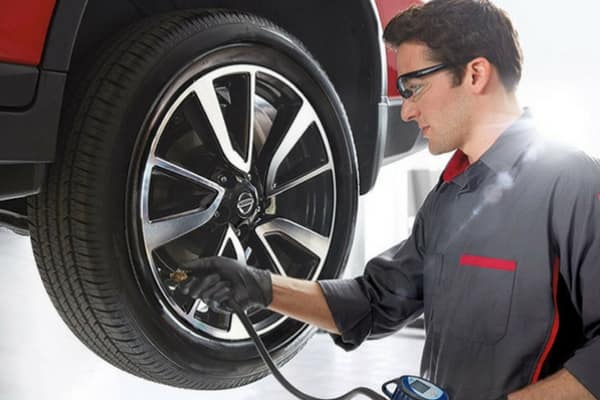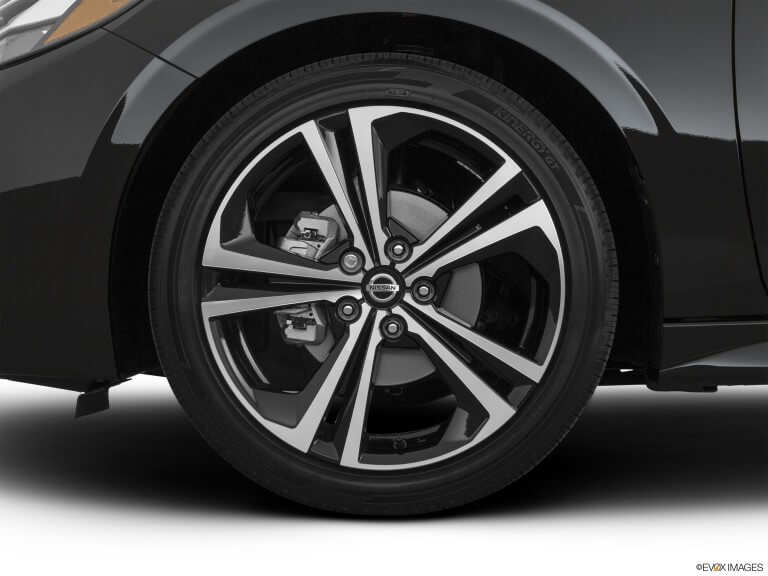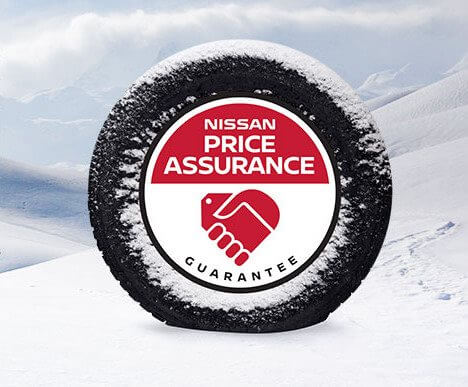Tire Center

Nissan Tire Center in Crystal Lake, IL
Although it can be time-consuming and expensive, tire replacement is a necessary part of car maintenance. When you bring your car in to get the tires serviced at M'Lady Nissan, we’ll check your tire tread, inspect for balding, test the pressure, and more. We’ll also perform a tire rotation to ensure they are wearing evenly, allowing them to last longer, be more efficient, and handle reliably. Every five or six years, your tires will need to be replaced.
Our team of highly trained professionals have the passion and knowledge for your tire requirements and are happy to recommend the best possible tires for your lifestyle demands. Our M'Lady Nissan team is devoted to delivering the finest customer service and sourcing the highest quality tires obtainable. Browse our website to see the tire specials and deals we have on offer. Pick up the phone and call us. Alternatively, send us an email outlining your needs, and we will reply with a solution.
Why New Tires Are Important
The ability to control a vehicle depends on the grip between the tires and road surface. Tires do not require tread designs or even considerable tread depth to provide grip on dry surfaces. However, tires do require tread designs with sufficient depth to generate traction on wet, snow-covered, and slushy roads. So tread design is essential to guide water and slush from between the tire and the surface of the road.
When water pools on the road surface, the depth of the water, the speed of the vehicle, and weight of the car, as well as the design and depth of the tires' tread mutually govern when and if the vehicle will hydroplane and how quickly a vehicle can stop in an emergency.
Naturally, the tire tread will wear down over the life of the tire, and decrease the depth of its grooves. While this occurs so slowly that you will not notice it visibly on a day-to-day basis, eventually there will come a time when you will detect the car slipping in the snow, an aquaplane in the wet or just not stopping as efficiently on slippery surfaces. If the water is unable to escape fast enough, your tires will be forced to aquaplane (float) on top of the water, resulting in a loss of traction and increased stopping lengths.


Tire Inspection
Every time you bring your car to our Service Center for any maintenance job, our team of certified technicians will inspect the exterior of your tires free of charge. Whether it’s an at home inspection or a professional tire inspection, warning signs to look out for include:
Types of Tire Replacements
As a rule of thumb, different tire types should not be on a vehicle simultaneously. Owners should not mix tires with different tread designs, internal structures or sizes, and use matching tires on all of the vehicle's wheels to sustain the best stability and control. Furthermore, drivers should never operate a vehicle with winter tires, and summer tires fitted together, or mix non-run-flat tires with run-flat tires.
The best choice is to replace your tires with the exact tire that the manufacturer fitted to the vehicle. The manufacturer of the car will have placed a tire specification plaque, usually, inside the driver's door opening, stating the ratings, size, and air pressures for the tires recommended for this vehicle. Follow these specifications to the letter when replacing your tires and you will have years of safe, trouble-free motoring.
The tires supplied with your vehicle are covered against defects in material or quality under the warranty coverage of your new car. Normal wear is not, and that may occur before the vehicle warranty expires and replacement will be at your cost.
Most tire manufacturers today offer a limited tire warranty on new tires to cover you from road hazards like sharp road debris causing cuts and punctures, or flats from deep pothole damage for the first few months or even in some cases the life of the tire.


Types of Tires
Tires come in a wide variety, offering different types for various climates, terrains, seasons, and performance goals. Choosing the appropriate tires for each individual situation and requirement is crucial for your safety, handles, and performance. Explore the different tire types below to find out which is best for your lifestyle demands.
Why M’Lady Nissan?
We aim to satisfy our customers and our skilled customer care department will accommodate your every personal need that can be relevant to vehicle maintenance or tire replacement. Everyone has different requirements and our customer care specialists will come up with the best possible solutions to suit your budget.
Explore the offers, incentives, and the continually changing specials we have available on all new Nissan models in Crystal Lake, IL. At M'Lady Nissan, we are delighted to offer manufacturer rebates & financing specials to all of our customers and look forward to saving you money on your next new Nissan.
Tire FAQs
It’s recommended to change your tires every five to six-year depending on your driving habits and terrain.
You should get your tires rotated during your routine oil changes or every six months to once a year.
Yes, regular tire rotations are essential to your safety and your car’s performance.
A tire rotation moves your tires around to ensure they wear evenly due to some tires receiving more wear than others based on braking, turning, and other factors.
Tire inflation ensures you are getting the performance you expect every time you get behind the wheel. Ensuring stopping power, efficiency, and traction.
Once a month after your car has been off for at least 3 hours.
A wheel alignment tests your vehicle’s drivability and tire life. Vehicles that pull one way or the other and have uneven wear may have unaligned wheels.
An out-of-balance wheel can produce multiple complications with wear-on shocks, bearings, and other suspension parts.
Use a coin as a tread depth gauge; insert a penny into the tread, Lincoln’s head down. If the top of Abe’s head touches the tread face, your tires are at 2/32” depth, the minimum required by law, and it’s time for a replacement. Now try the test again with a quarter. Does the tread reach Washington’s head? If so, your tread depth is 4/32”. One more time with the penny - if the tread reaches the Lincoln memorial, your tread depth is 6/32”.



 Call Sales
Call Sales Directions
Directions